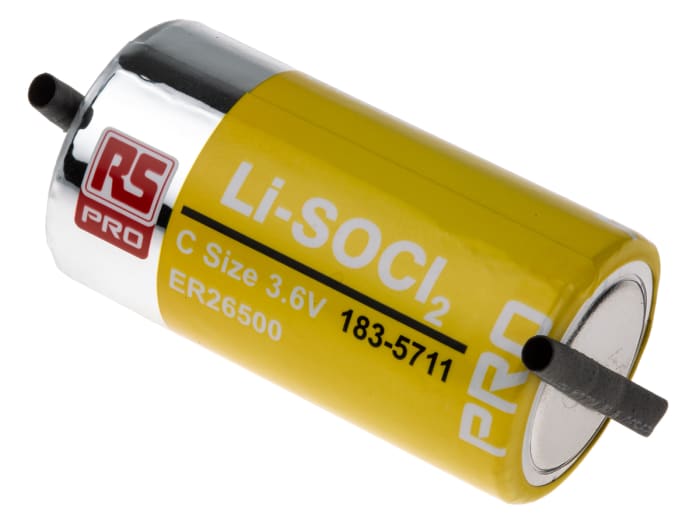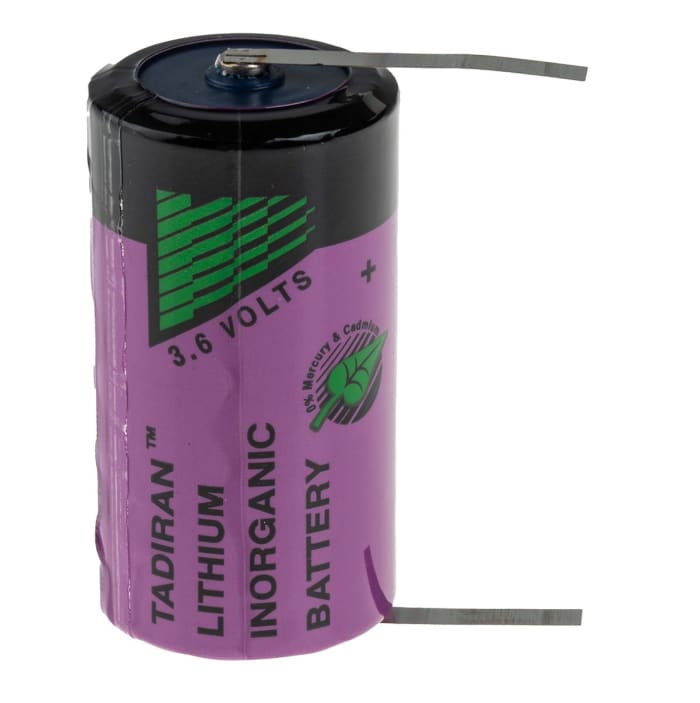Technical Document
Specifications
Product details
Saft 3.6V Lithium Thionyl Chloride Cells With Radial Tabs
The 3.6V lithium thionyl chloride battery with radial tabs from Saft is a high powered battery with high energy density, making it ideal for use in low current drain applications. These powerful batteries offer a low self-discharge rate and a wide operating temperature range, ensuring a secure power source with minimal discharge. The Saft 3.6V battery with tabs has one of the highest nominal capacities available within the market, offering a high reliable source of power.
The Saft 3.6V battery with tabs feature a high voltage response that is stable during most the lifetime of the application, providing a battery that will perform at optimum level from start up. All cells are hermetically sealed in stainless steel cans (low magnetic signature & superior resistance to atmospheric corrosion).
When soldering take special care not to solder straight onto the cell, instead use the tabs provided.
Key Features
• Hermetically sealed stainless steel container
• Built-in safety vent
• Finish with 5 A fuse
• Non-flammable electrolyte
Benefits
• High voltage response, stable during most of the lifetime of the application
• High drain/pulse capability
• Wide operating temperature range (-60゚C/85゚C)
• Easy integration in compact system
• Low self-discharge rate
Typical Applications:
Due to the outstanding performance of Saft batteries, these 3.6 V batteries are ideal for use in a range of applications that require a stable and powerful energy source such as:
• Computer RAMS
• Clocks
• Alarms
• Sensors
• Smart water and gas meters
Are Lithium Thionyl Chloride Batteries Harmful?
Lithium Thionyl Chloride batteries can sometimes leak a substance called potassium hydroxide which is a caustic agent that can cause eye, skin and respiratory irritations. This risk is reduced by not mixing different manufacturer battery types, batteries of different chemistry and by the replacement of all batteries at the same time.
How to dispose of Lithium Thionyl Chloride Batteries?
Recycle responsibly, a wide range of schemes are available.
Safety Advice
• Keep out of sight and reach of children.
• Fire, explosion and burn hazard - do not recharge, short circuit, crush, disassemble, incinerate
• Due to the high terminal voltage (3.6V), they are not suitable as direct replacements for other battery technologies in the same can sizes.
Guidance
• Always install the batteries correctly as per instruction
• Ensure that the contact points are clean and conductive
• Do not mix different types of battery
• Do not heat or attempt to recharge the battery
• Do not dispose of in a fire
SR 211.80
SR 211.80 Each (ex VAT)
SR 243.57
SR 243.57 Each (inc. VAT)
1
SR 211.80
SR 211.80 Each (ex VAT)
SR 243.57
SR 243.57 Each (inc. VAT)
Stock information temporarily unavailable. please contact rs@ae.com.sa for more details.
1
Stock information temporarily unavailable. please contact rs@ae.com.sa for more details.
Technical Document
Specifications
Product details
Saft 3.6V Lithium Thionyl Chloride Cells With Radial Tabs
The 3.6V lithium thionyl chloride battery with radial tabs from Saft is a high powered battery with high energy density, making it ideal for use in low current drain applications. These powerful batteries offer a low self-discharge rate and a wide operating temperature range, ensuring a secure power source with minimal discharge. The Saft 3.6V battery with tabs has one of the highest nominal capacities available within the market, offering a high reliable source of power.
The Saft 3.6V battery with tabs feature a high voltage response that is stable during most the lifetime of the application, providing a battery that will perform at optimum level from start up. All cells are hermetically sealed in stainless steel cans (low magnetic signature & superior resistance to atmospheric corrosion).
When soldering take special care not to solder straight onto the cell, instead use the tabs provided.
Key Features
• Hermetically sealed stainless steel container
• Built-in safety vent
• Finish with 5 A fuse
• Non-flammable electrolyte
Benefits
• High voltage response, stable during most of the lifetime of the application
• High drain/pulse capability
• Wide operating temperature range (-60゚C/85゚C)
• Easy integration in compact system
• Low self-discharge rate
Typical Applications:
Due to the outstanding performance of Saft batteries, these 3.6 V batteries are ideal for use in a range of applications that require a stable and powerful energy source such as:
• Computer RAMS
• Clocks
• Alarms
• Sensors
• Smart water and gas meters
Are Lithium Thionyl Chloride Batteries Harmful?
Lithium Thionyl Chloride batteries can sometimes leak a substance called potassium hydroxide which is a caustic agent that can cause eye, skin and respiratory irritations. This risk is reduced by not mixing different manufacturer battery types, batteries of different chemistry and by the replacement of all batteries at the same time.
How to dispose of Lithium Thionyl Chloride Batteries?
Recycle responsibly, a wide range of schemes are available.
Safety Advice
• Keep out of sight and reach of children.
• Fire, explosion and burn hazard - do not recharge, short circuit, crush, disassemble, incinerate
• Due to the high terminal voltage (3.6V), they are not suitable as direct replacements for other battery technologies in the same can sizes.
Guidance
• Always install the batteries correctly as per instruction
• Ensure that the contact points are clean and conductive
• Do not mix different types of battery
• Do not heat or attempt to recharge the battery
• Do not dispose of in a fire




